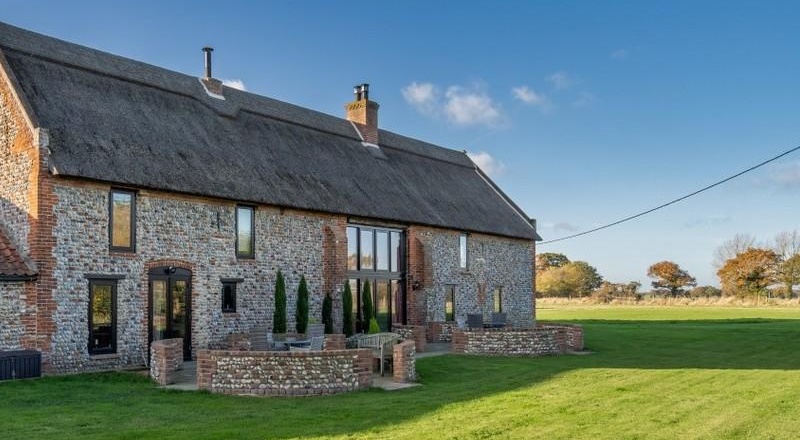Yes, of course they are!
Holiday let mortgages have been available in Scotland for many years now.
Whether you are looking for a Highland hideaway or a cosy cottage on the coast, we can help you get the finance you need.
In this guide we look at the availability of mortgages in Scotland, the house buying process and how to get the best mortgage.
What is a holiday let mortgage?
When you apply for a mortgage on a property, you have to select the right type of mortgage for how the property is being used. So for your own home you will need to have a residential mortgage, and the lender will be expecting you to live there as your main residence.
A holiday let mortgage is a specific type of mortgage that permits the property to be let out for short periods to paying guests. Primarily these will be people on holiday or enjoying a short break.
No-one will live there permanently and so there will be times when the property stands empty.
Conversely, a successful holiday let may see new guests arriving each week throughout the year.
When assessing a mortgage application the lender will want to see that you can afford the monthly mortgage repayments and that should the worst happen they would be able to sell the property to clear the mortgage debt. A holiday let carries the risk that the property may not be booked out for long periods of time, maybe due to the weather, and therefore the landlord/owner needs to be able to afford the repayments.
Additionally, there are quite a few properties in Scotland and the UK with restrictions, so they can only be used for short term rentals.
ie You are not permitted to live there permanently.
This poses a risk for the lender in the event of repossession when it tries to dispose of the property.
Holiday Let Mortgage Options
When applying for a holiday let mortgage you still have the basic mortgage options available to you:
Interest rate – Fixed, tracker, variable etc
Repayment method – Interest-only, repayment or part and part
Mortgage term – 5 to 40 years
Limited company – SPV mortgages are available
How is this different to a buy to let mortgage?
From the outside it may seem fair to assume that a holiday let mortgage and a buy to let mortgage are pretty much the same thing. They are mortgages for Scottish properties that are rented out.
And this assumption would be correct.
But it is still wrong.
The difference is ‘how’ the properties are rented out and this fundamentally changes what lenders are available and what size of mortgage is possible.
HOLIDAY LET
All tenants (guests) will only stay for short periods of time. They will book for weekend breaks or a holiday of 1-2 weeks.
The rent is normally calculated daily or weekly and will be payable in full before arriving at the property, all running costs will be included.
The property will be fully furnished, including all items such as bedding, crockery, and white goods.
At no point will a guest have claim to remain in the property beyond the time that they have paid for and a busy holiday rental will welcome dozens of guests throughout the year.
BUY TO LET
A buy to let can only be rented to tenants who have signed an Assured Shorthold Tenancy agreement.
This will either be for six or twelve months initially, but will have the option to be extended.
The rent is normally fixed for each duration and tenants are responsible for all bills including utilities.
The property can be let as furnished or unfurnished and the tenants will occupy the property as their main residence.
Mortgage availability in Scotland
Holiday let mortgages are readily available in Scotland and it is a very popular location for property investors.

Although the process of buying a house in Scotland is different to other parts of the UK, arranging a mortgage is straightforward enough.
Of the 25 or so lenders operating in the UK holiday let sector, around half will accept properties in Scotland. And this number is further diluted as not all lenders can accept homes in the highlands or islands.
So if you are interested in the Scottish Highlands, Inner and Outer Hebrides. Isles of Scilly, Arran, Mull, Skye, Lewis and Harris please bear this in mind.
Our brokers do have access to lenders who are happy with the Scottish Highlands and Islands but the application process could take a little longer.
Remortgages
A remortgage allows you to switch your mortgage over to a new lender. Often this is done to obtain a better deal on the interest rate.
But it is also an opportunity to change the mortgage type according to how the property will be used.
For example, you may currently own a single let property that has a buy to let mortgage. You would like to change the property to a holiday let as the rental income should be higher.
By applying for a holiday let remortgage you can switch deals and lenders, while at the same time gaining approval from the new lender to use the property as a holiday let. You could even borrow a little extra at the same time.
How much can you borrow?
Although your income is important when applying for a holiday let mortgage, it does not determine the potential size of the mortgage. This is very different to how a residential mortgage would work for your own home.
The amount you can borrow is affected by two things:
The rental income
The gross rental income is used by lenders to calculate how much they could lend you. This needs to be confirmed by a recognised letting agent, who should identify the different amounts chargeable across the low, mid and high seasons in a 12 month period.
The lender will take an average of these and then apply a stress test. Generally, you need to have a gross rental income of 125%-145% of the monthly mortgage payments (interest only) when calculated at the lender’s reference interest rate.
The maximum loan to value
The loan to value, or LTV, is a maximum percentage set by the lender. All mortgages are measured against the value of a property, and this then gives a loan to value.
So if you had a mortgage of £200,000 on a property worth £300,000 your LTV would be 66%.
The maximum loan to value for holiday rental properties is 75%. So even if the rental calculation above produced a possible loan that equals 80% of the property value, the lender will only go upto 75%.
The house buying process
If you want to buy a house or flat in Scotland there’s a legal process you have to follow. This makes sure both the buyer and seller are protected during the sale.
Your solicitor plays a big part in the process and their range of duties extends beyond what we recognise as conveyancing.
We have provided a brief outline of the Scottish house buying process below but we have links at the end of this section to sites that cover this in more detail.
Arranging a mortgage
Once you have established the price range you want to buy at you will need to approach your mortgage broker to arrange a mortgage.
While at this point it will not have any specific property details, it will get you pre-approved and allow you to make an offer on a property in the next stage.
Finding a property
If you find a home you’re interested in, ask the seller or their solicitor or estate agent for a Home Report.
This is a document that tells you what you need to know about the house. It’s split into three parts – a single survey and valuation, a property questionnaire and an energy report.
Making an offer
Your offer must be made by your solicitor. The seller will then consider the offer.
If they agree, their solicitor will send you a document called a ‘qualified acceptance’, which means they accept the offer depending on certain conditions.
The seller’s solicitor and your solicitor will then send each other letters negotiating these conditions. These letters are called ‘missives’.
Once the missives are accepted and both you and the seller agree on the terms, you have a binding contract.
Conveyancing
After the missives have been sent and you have an agreed contract with the seller, your solicitor will start the ‘conveyancing‘ work.
This means they will go through the legal process that transfers ownership of the home from the seller to you. This will include inspecting the deeds, checking for ownership, unusual conditions or burdens.
The last step in buying a home is the completion or ‘settlement’. This is when you get possession of the home, and usually happens on the agreed date of entry.
Scotland imposes a Land and Buildings Transaction Tax (LBTT) instead of Stamp Duty.
You may find these pages useful:
https://www.mygov.scot/buying-a-home
https://www.citizensadvice.org.uk/scotland/housing/buying-and-selling-s/buying-a-home-s/
How to get a mortgage in Scotland
With a slightly different legal process and a smaller pool of lenders, it is helpful to find yourself an independent broker who is experienced with Scottish mortgages and holiday letting.
You’ll want a mortgage broker who has the right contacts for Scottish lenders, so you get the maximum possible choice, leading to the best deals. This help is even more essential if you are considering the Scottish highlands and islands.
Unlike in England and Wales, you will need to be pre-approved by a lender before you can make an offer to buy. This is a bit more in depth than an agreement in principle. The Scottish system is different and things can move quickly, so to be taken seriously and comply with the various deadlines, you’ll need to be organised.
You don’t need a mortgage broker who is based in Scotland to help you, there’s no difference to the range of lenders to pick from. But you should choose one who has experience of the Scottish system.
Respect Mortgages works with an award winning independent mortgage broker who have over 45 years of experience in dealing with mortgages in England, Wales and Scotland. They are holiday let specialists with advisers across the UK.
FREQUENTLY ASKED QUESTIONS

Can I live in my holiday let?
Most lenders will be happy for you and your family to take breaks and holidays in the property. However, no-one can live permanently in a holiday let.
What deposit is needed?
The maximum loan to value is 75% and so a 25% holiday let deposit is required by most lenders.
What income do I need for a holiday let?
You will need to prove a minimum earned income of around £25,000pa.
Can I apply as a limited company?
Yes. Holiday let mortgages are available to limited companies and SPVs.
Are these mortgages suitable for an Airbnb property?
In principle yes. Some lenders have been slow to react to the popularity of Airbnb so you should ask your broker to check at an early stage.
Will I need planning permission?
Letting out a property as a holiday let can sometimes require planning permission. It is wise to ask your solicitor to check for any restrictions or covenants in the deeds and also ask the local Scottish council.


